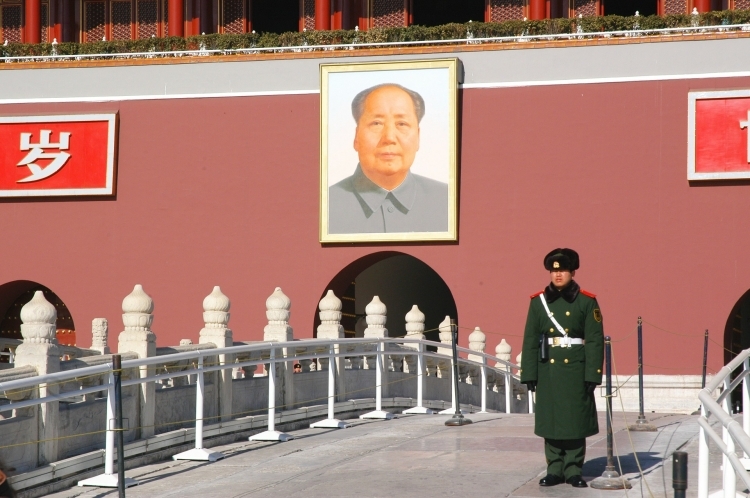Mohawks, Studs, and The Cultural Revolution

Do you want to get into punk, but you think bands like The Sex Pistols, The Ramones, and Black Flag are corporate sellout posers? Are you also tired of hearing about Communism from the lens of upper-middle class white suburbia? Look no further: below are four bands that are the real deal. Punk has, since it's founding in 1974 by group Death, been a genre that's all about politics. Something happened after the golden age of Punk (considered to be between 1975 to 1985), where it became a sterile, derivative genre with little to no musical or cultural growth. "Punk is Dead" are words frequently uttered by a rowdy, studded-and-mowhawked crowd. The truth, as usual, is more complicated than what the surface appears to be. Like most underground genres, quality punk isn't floating around for just anybody to find—you have to dive deep through a lot of terrible music in order to find quality material. This isn't about quality music though; this is about the message of Maoism. Maoist Punk can be found scattered through any scene and can be anywhere punk is. It co-exists with Marxist, Anarchist, Feminist, Queer, and almost any other kind of leftist political movement. Therefore, the history of Maoist Punk is hard to chronicle without also chronicling the vast history of Punk and it's various sub-genres. Before this kicks off, let's start with a definition of Maoism, as that'll help with the political framework that the bands featured here exist. The dictionary definition of Maoism is, "the communist doctrines of Mao Zedong as formerly practiced in China, having as a central idea permanent revolution and stressing the importance of the peasantry, small-scale industry, and agricultural collectivization.". With that in mind, it's time to look at some of the bands that promote this doctrine.
The Rondos
Considered to be one of the first Maoist bands, Dutch rockers The Rondos made quite an impact in their two years of activity. Phill Free, the guitarist of contemporary band Crass, says in the book The Story of Crass, said "The Rondos were Maoists—bloody heavy. Jesus, they were frightening! Serious! They made us look like a vaudeville show! The're probably still doing time for something!" However, That isn't quite true. After the band split in 1980, two members continued an anarchist, communist, and Rastafarian propaganda magazine called Racket before calling it quits in 1981. Then, they opened a bookshop called Racketbasis with the intention of spreading the message of rebellion and resistance. It all ended in 1987 when some of the band moved from Rotterdam to Amsterdam. All the information comes from the Rondo's autobiography, which is freely available online. They released their only album Red Attack in 1980.
Gum Bleed
Fast forward to 2006, Chinese band Gum Bleed has taken the mantle that The Rondos set down. Coming from Beijing, the band wants to tear as much hell as possible, a true punk rock mentality. There are not a lot of interviews with the band, but one on a forum called Revleft in 2009 had much to say. Frontman Jon Dee, when asked about the meaning of punk, said, "Punk is a weapon from the working class, use music to resist and fight." When asked about situation in Tibet, Dee shared a slightly unconventional opinion: "About the Tibet, it was liberated by the great People's Liberation Army leading by the Chairman Mao. Now Dalai Lama wants to do a restoration, to bring the serf system and the feudal system back. Dalai is only a puppet of western imperialist countries. We do not advocate the separatism, we advocate overthrowing all of the reactionary regimes." For such a rowdy band, they have been very quiet when it comes to publicity and news. However, the band is still very active today, and in 2016 embarked on a month-long European tour. You can find their albums on Bandcamp.
Flattbush
From Los Angeles, California comes Flattbush. Discarding the more technical riffs of Gum Bleed and the twanginess of The Rondos, Flattbush go for a rougher, aggressive, distorted approach. They blend the styles of punk and metal to create what can only be described as a sonic assault. This style is called "powerviolence". Two of the band members are originally from The Philippines, and their music is centered around anti-imperialism, with focus on U.S. troops stationed there. Their Facebook page says it all, with messages of anti-imperialism interspersed with promotional material. In a brief interview on Flattbushblog (Very creative), the singer and drummer talk about their influences. Most notably, their influence was how they were treated by their fellow classmates and the attitude of powerviolence legends Brujeria. Their lyrics are in Tagalong and English.
Maria T-TA y el Empujón Brutal
Translated as "Maria T-TA and Brutal Push", this band is one of the few Maoist punk bands with a frontwoman. Based in Lima, Peru, the band was active during the revolution in the 1980s and the early 90s. They supported the Maoist inspired Sendredo Luminoso (or Shining Path). Very little is known about the band, but an article from Subte Rock, a Latin American rock publication, tells the story of a young girl who attended a punk show, loved it, then spent two years in a male dominated, drug-filled world. The band split up in 1987. Few interviews exist (the only one I could find was one from 1987, close to the band's breakup), and no translations exist. A true underground band that makes the additional statement that women have a place in the male-dominated scene.
Maoist punk exists beyond bounds such as race, nationality, or gender. It exists as a self-propelling entity and it shows no sign of stopping. An anonymous quote says, "Punk's not dead. Punk's not born. Punk is, motherf*****."







